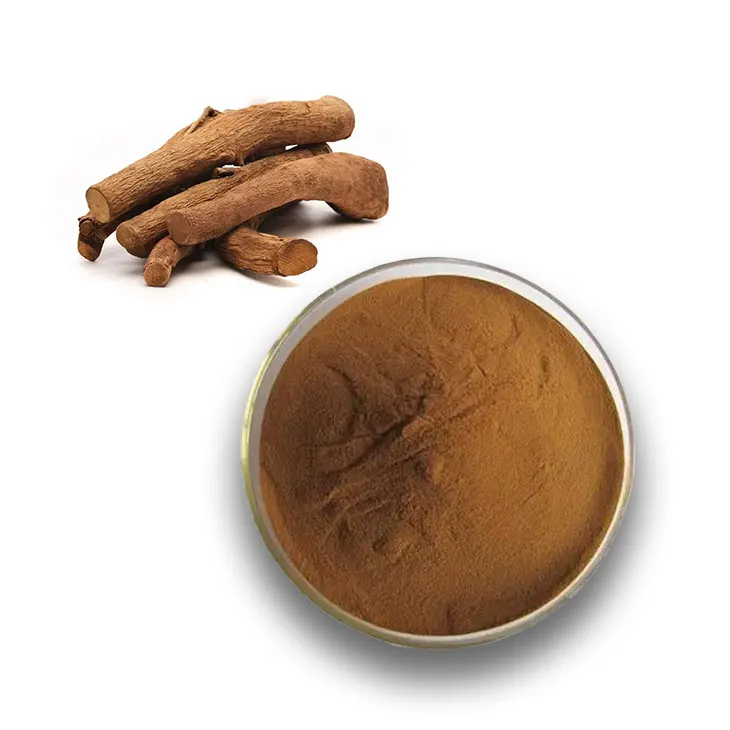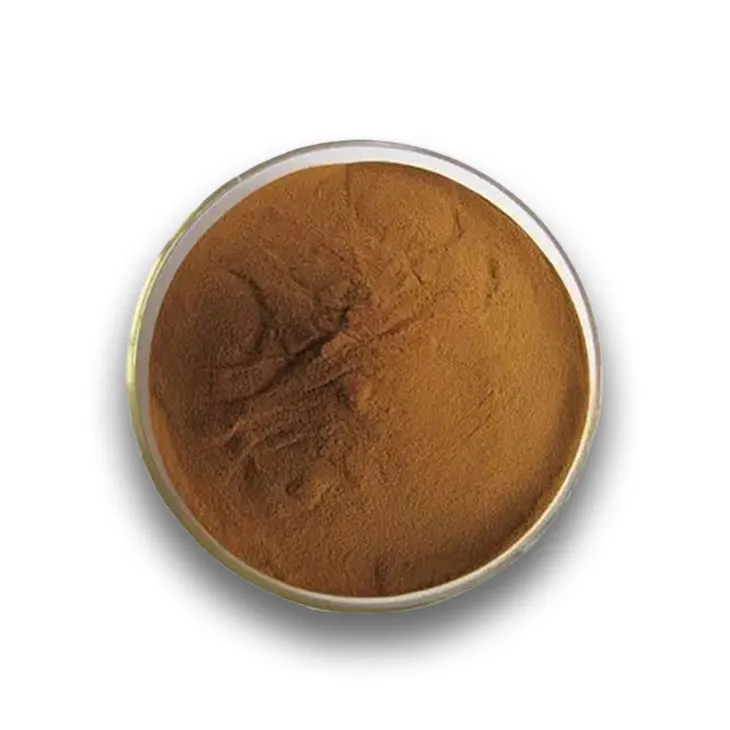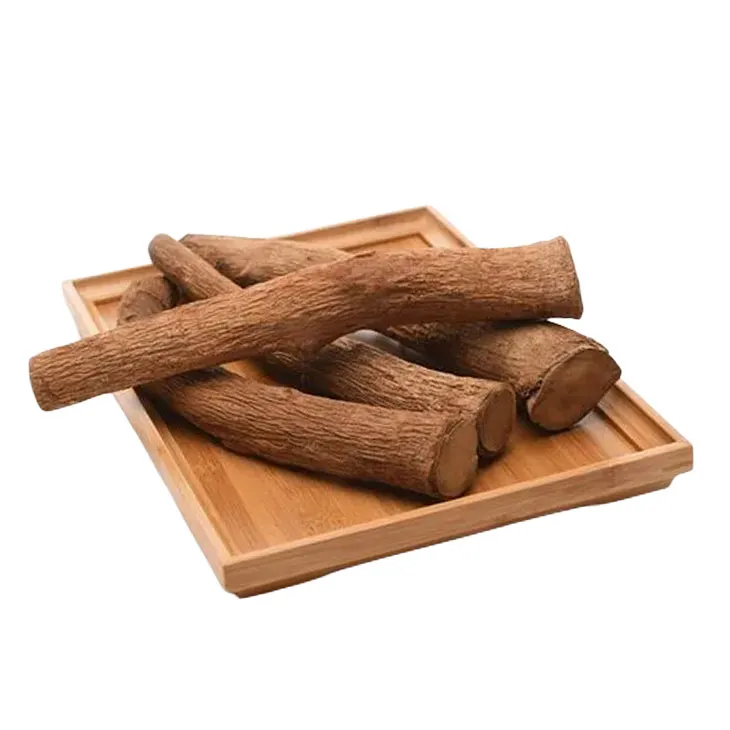- 0086-571-85302990
- sales@greenskybio.com
Benefits of Tongkat Ali Extract in Cattle Feed.
2024-11-13

1. Introduction
Tongkat Ali, also known as Eurycoma longifolia, has been widely studied for its potential benefits in various fields, including human health and animal husbandry. In recent years, the use of Tongkat Ali Extract in cattle feed has attracted increasing attention. This extract contains a variety of bioactive compounds that can have a positive impact on cattle's physiological functions and production performance.

2. Boosting Energy Metabolism
2.1 Role of Bioactive Compounds Tongkat Ali Extract is rich in bioactive compounds such as alkaloids and quassinoids. These compounds play a crucial role in boosting the energy metabolism of cattle. Alkaloids, for example, can interact with enzymes in the body that are involved in energy - producing pathways. They can enhance the activity of mitochondria, which are the powerhouses of cells. Mitochondria are responsible for converting nutrients into adenosine triphosphate (ATP), the main energy currency of the cell. By improving mitochondrial function, Tongkat Ali Extract enables cattle to produce more energy from the feed they consume.
2.2 Improved Feed Utilization When cattle have enhanced energy metabolism, they are better able to utilize feed resources. Cattle are ruminant animals, and their digestive system is complex. Tongkat Ali extract can help optimize the fermentation process in the rumen. It can promote the growth of beneficial microorganisms in the rumen that are involved in breaking down complex feed components such as cellulose and hemicellulose. As a result, more nutrients from the feed can be absorbed and utilized by the cattle's body, reducing feed waste and improving the overall efficiency of feed conversion.

3. Reducing Stress in Cattle
3.1 Adaptation to the Rearing Environment Cattle are often exposed to various stressors in the rearing environment, such as changes in temperature, humidity, and management practices. Stress can have a negative impact on their health and productivity. Tongkat Ali extract may play a role in reducing stress in cattle. It can modulate the stress response system in the body. The extract can affect the hypothalamic - pituitary - adrenal (HPA) axis, which is responsible for regulating the body's stress response. By normalizing the activity of the HPA axis, Tongkat Ali extract helps cattle to better adapt to environmental changes and management - related stressors.
3.2 Behavioral and Physiological Indicators There are several behavioral and physiological indicators that suggest the stress - reducing effect of Tongkat Ali extract. Behaviorally, stressed cattle may show signs such as restlessness, reduced feeding activity, and increased aggression. Cattle fed with Tongkat Ali extract in their feed tend to exhibit more normal behavior patterns. Physiologically, stress can lead to increased levels of stress hormones such as cortisol in the body. Tongkat Ali extract has been shown to help regulate cortisol levels, maintaining them within a normal range. This not only reduces the negative impact of stress on the cattle but also promotes their overall well - being.

4. Improving the Quality of Cattle Products
4.1 Milk Quality In dairy cattle, the use of Tongkat Ali extract in feed can have a significant impact on milk quality. The extract can influence the composition of milk. It may increase the levels of beneficial components in milk, such as proteins, vitamins, and minerals. For example, some studies have shown that Tongkat Ali extract can enhance the production of casein, which is one of the main proteins in milk. Higher - quality milk with improved nutritional value can be obtained, which is beneficial for consumers.
4.2 Meat Quality For beef cattle, Tongkat Ali extract also has the potential to improve meat quality. It can affect the marbling of meat, which refers to the intramuscular fat deposition. Appropriate marbling is an important factor in determining the tenderness, juiciness, and flavor of meat. Tongkat Ali extract can promote the deposition of healthy fats in the muscle tissue, resulting in more tender and flavorful meat. Additionally, it may also have an impact on the antioxidant capacity of meat, which can help maintain the freshness and quality of meat during storage and processing.
5. Safety and Considerations
5.1 Dosage and Administration When using Tongkat Ali extract in cattle feed, it is important to consider the appropriate dosage and administration. The dosage should be carefully determined based on factors such as the age, weight, and physiological state of the cattle. Over - dosage may lead to potential adverse effects, while under - dosage may not achieve the desired results. It is recommended to follow the guidelines provided by veterinarians or animal nutrition experts.
5.2 Quality Control of the Extract The quality of Tongkat Ali extract used in cattle feed is crucial. There should be strict quality control measures to ensure that the extract is pure, free from contaminants, and contains the appropriate levels of bioactive compounds. The source of the extract, the extraction method, and the storage conditions can all affect its quality. High - quality Tongkat Ali extract is more likely to provide the expected benefits to cattle.
6. Conclusion
Tongkat Ali extract has several potential benefits when used in cattle feed. It can boost energy metabolism, reduce stress, and improve the quality of cattle products. However, proper dosage and quality control are essential to ensure its safe and effective use. With further research and development, Tongkat Ali extract may become an important component in modern cattle husbandry, contributing to more sustainable and high - quality production of cattle products.
FAQ:
1. How does Tongkat Ali extract boost the energy metabolism of cattle?
Tongkat Ali extract may contain certain bioactive compounds. These compounds could interact with the physiological processes in cattle's bodies. For example, they might enhance the function of mitochondria, which are the powerhouses of cells and are crucial for energy production. This interaction can lead to more efficient breakdown of nutrients from the feed and subsequent energy release, thus boosting the energy metabolism.
2. Can Tongkat Ali extract really reduce stress in cattle?
There is evidence to suggest that it can. Stress in cattle can be caused by various factors such as environmental changes, overcrowding, etc. Tongkat Ali extract may have components that regulate the hormonal balance in cattle. For instance, it could modulate the release of stress - related hormones like cortisol. By doing so, it helps the cattle to be more calm and better adapted to the rearing environment, thus reducing stress.
3. In what ways does Tongkat Ali extract improve the quality of milk?
Tongkat Ali extract might influence the composition of milk. It could potentially increase the content of beneficial nutrients in milk such as proteins and certain vitamins. This may be due to its effect on the metabolism of the dairy cows. For example, it could enhance the absorption of nutrients from the feed that are then transferred to the milk, leading to an improvement in milk quality.
4. How does Tongkat Ali extract improve the quality of meat?
When added to cattle feed, Tongkat Ali extract may affect the growth and development of muscle tissue in cattle. It could promote muscle protein synthesis, which results in better - developed muscles. Additionally, it might also influence the fat deposition in the meat, leading to a more desirable ratio of muscle to fat, and ultimately improving the overall quality of the meat.
5. Are there any potential side effects of using Tongkat Ali extract in cattle feed?
Currently, while there is much evidence of its benefits, more research is needed regarding potential side effects. However, if used in appropriate amounts, no significant adverse effects have been widely reported so far. But improper dosage or long - term excessive use could potentially lead to unforeseen consequences. For example, it might disrupt the normal hormonal balance in an extreme case if overused.
6. How should Tongkat Ali extract be added to cattle feed?
The proper dosage and method of addition are crucial. It should be added in accordance with the specific instructions based on the type and age of the cattle. Usually, it is mixed evenly with the regular feed components. The dosage needs to be carefully calibrated to ensure that the cattle receive the appropriate amount for the desired effects without over - or under - dosing.
Related literature
- The Role of Herbal Extracts in Livestock Nutrition"
- "Beneficial Effects of Natural Supplements in Cattle Rearing"
- "Tongkat Ali: Properties and Applications in Animal Husbandry"
- ▶ Hesperidin
- ▶ citrus bioflavonoids
- ▶ plant extract
- ▶ lycopene
- ▶ Diosmin
- ▶ Grape seed extract
- ▶ Sea buckthorn Juice Powder
- ▶ Beetroot powder
- ▶ Hops Extract
- ▶ Artichoke Extract
- ▶ Reishi mushroom extract
- ▶ Astaxanthin
- ▶ Green Tea Extract
- ▶ Curcumin Extract
- ▶ Horse Chestnut Extract
- ▶ Other Problems
- ▶ Boswellia Serrata Extract
- ▶ Resveratrol Extract
- ▶ Marigold Extract
- ▶ Grape Leaf Extract
- ▶ blog3
-
High purity olive leaf extract
2024-11-13
-
Lavender oil extraction method
2024-11-13
-
100% organic virgin sea buckthorn fruit oil
2024-11-13
-
Lotus leaf extract powder factory in China
2024-11-13
-
China aged garlic extract supplier
2024-11-13
-
Deer antler extract powder manufacturer
2024-11-13
-
Saw palmetto extract vs whole herb
2024-11-13
-
Hawthorn Extract
2024-11-13
-
Echinacea Extract
2024-11-13
-
Sophora Flavescens Root Extract
2024-11-13
-
Mulberry Extract
2024-11-13
-
Avocado Extract Powder
2024-11-13
-
Pine bark Extract Powder
2024-11-13
-
Ivy Extract
2024-11-13
-
Wheat Germ Extract
2024-11-13
-
Angelica sinensis extract
2024-11-13
-
Maca Extract
2024-11-13





















